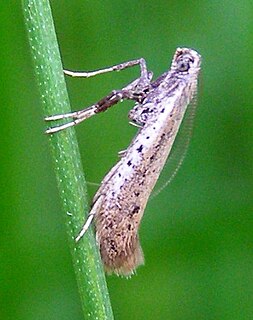
Arthur Gardiner Butler F.L.S., F.Z.S. (1844–1925) was an English entomologist, arachnologist and ornithologist. He worked at the British Museum on the taxonomy of birds, insects, and spiders.

Gracillariidae is an important family of insects in the order Lepidoptera and the principal family of leaf miners that includes several economic, horticultural or recently invasive pest species such as the horse-chestnut leaf miner, Cameraria ohridella.
Herbert Druce, FLS was an English entomologist. His collections were acquired by Frederick DuCane Godman (1834–1919), Osbert Salvin (1835–1898), and James John Joicey (1870–1932) before being bequeathed to the Natural History Museum, London. He is not to be confused with his son, the English entomologist Hamilton Herbert Druce, who also worked on Lepidoptera.

George Talbot FES was an English entomologist who specialised in butterflies. He wrote about 150 scientific papers, the majority being primarily systematic, consisting of the description of new species or the revision of various genera. He was also responsible for the curation and preservation of the Joicey collection of Lepidoptera prior to its accession by the Natural History Museum.
Matthew William Kemble Connolly was a British army officer and malacologist.

Aspilapteryx is a genus of moths in the family Gracillariidae.
Aspilapteryx inquinata is a moth of the family Gracillariidae. It is known from Turkey, Lebanon, Italy and the North Aegean Islands.
Aspilapteryx magna is a moth of the family Gracillariidae. It is known from the Alborz region in Iran.

Aspilapteryx tringipennella is a moth of the family Gracillariidae. It is known from all of Europe.
Aspilapteryx tessellata is a moth of the family Gracillariidae. It is known from New South Wales, Australia.
Aspilapteryx filifera is a moth of the family Gracillariidae. It is known from Namibia and South Africa.
Aspilapteryx grypota is a moth of the family Gracillariidae. It is known from South Africa.

Phyllocnistis helicodes is a moth of the family Gracillariidae, known from Bihar, India. The hostplant for the species is Polyalthia longifolia.

Caloptilia linearis is a moth of the family Gracillariidae. It is known from New Zealand.
Povolnya platycosma is a moth of the family Gracillariidae. It is known from Sri Lanka.
Acrocercops pentalocha is a moth of the family Gracillariidae, known from Karnataka, India. It was described by Edward Meyrick in 1912. The hostplant for the species is Mangifera indica.
Louis Beethoven Prout (1864–1943) was an English entomologist and musicologist.
Banisia aldabrana is a species of moth of the family Thyrididae. It is found in the Seychelles on the islands of Aldabra, Menai and Cosmoledo and in South Africa.

Gracillariinae are a subfamily of moths which was described by Henry Tibbats Stainton in 1854.






